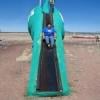-
Content Count
39 -
Joined
-
Last visited
Struggling with my weight has been a lifelong issue for me. I cannot remember a time where my weight wasn’t brought up at a doctor’s visit. Being a child, I can remember being referred to as “pleasantly plump†or “chubbyâ€. While chubby may have come across as harmless, I eventually stopped being chubby and became overweight. Now at 24 years old, being 5’10†and weighing in at 280 pounds (pre-op), I am no longer overweight, I am morbidly obese and regardless of my age, it has started to affect my health.
I have tried other weight loss options before including Weight Watchers, a low-carb diet, a physician recommended diet, diet pills, Slim-Fast, Atkins Shakes and bars, along with attending my schools fitness center multiple times a week. Initially I lost some weight, but I either stopped losing the weight or regained it back.
A comorbidity of my obesity is joint pain of my knees. My extra body weight adds trauma to my joints and my excess body weight can be a predictor of osteoarthritis down the road. My knees constantly bear the weight of the body and I especially feel it during times of increased activity, such as stair climbing, or at the gym and, as my doctor has informed me, in the future, it may be necessary for joint replacement to relieve the severe pain.
Another comorbidity I suffer from is dyspepsia, or GERD. My GERD symptoms worsen when I lie down because my extra body weight and fat tissue puts pressure on the stomach, which can sometimes push the stomach contents back up my esophagus. GERD-related complications can include erosive esophagitis and esophageal cancer and I do not wish to face that in the future
One of the scariest comorbidities I suffer from is high triglycerides. As a nurse, I know that having high triglycerides due to my obesity increases my risk of developing heart disease. High triglycerides can cause plaque build-up on my interior blood vessel walls and can increase my risk for developing certain medical conditions, including a heart attack and, the number one killer in America, heart disease. Having my triglycerides lowered following bariatric surgery and a healthy diet and exercise is my biggest goal.
My goals with my weight-loss surgery are first and foremost about improving and maintaining my health. I wish to lower my triglycerides, alleviate the pain in my knees, reduce my GERD-related symptoms and reduce my risk of weight-related morbidity and ultimately, mortality.
Bariatric surgery isn’t just about losing weight. It’s about transforming my life. I pursued weight loss surgery because I want to address my obesity and enhance my health. As a healthcare professional, I am very familiar as to how detrimental obesity really is. The health risks associated with carrying extra weight are severe and can decrease both my quantity and quality of life. Obese adults are more likely to be diagnosed with heart disease, high blood pressure, high cholesterol, diabetes, and gallbladder disease.
I know that my weight loss surgery is [i]not[/i] a minor procedure. I know that pursuing weight-loss surgery means that I must commit to long-term lifestyle changes, including diet and exercise, which are crucial to the success of my bariatric surgery.
I have tried other weight loss options before including Weight Watchers, a low-carb diet, a physician recommended diet, diet pills, Slim-Fast, Atkins Shakes and bars, along with attending my schools fitness center multiple times a week. Initially I lost some weight, but I either stopped losing the weight or regained it back.
A comorbidity of my obesity is joint pain of my knees. My extra body weight adds trauma to my joints and my excess body weight can be a predictor of osteoarthritis down the road. My knees constantly bear the weight of the body and I especially feel it during times of increased activity, such as stair climbing, or at the gym and, as my doctor has informed me, in the future, it may be necessary for joint replacement to relieve the severe pain.
Another comorbidity I suffer from is dyspepsia, or GERD. My GERD symptoms worsen when I lie down because my extra body weight and fat tissue puts pressure on the stomach, which can sometimes push the stomach contents back up my esophagus. GERD-related complications can include erosive esophagitis and esophageal cancer and I do not wish to face that in the future
One of the scariest comorbidities I suffer from is high triglycerides. As a nurse, I know that having high triglycerides due to my obesity increases my risk of developing heart disease. High triglycerides can cause plaque build-up on my interior blood vessel walls and can increase my risk for developing certain medical conditions, including a heart attack and, the number one killer in America, heart disease. Having my triglycerides lowered following bariatric surgery and a healthy diet and exercise is my biggest goal.
My goals with my weight-loss surgery are first and foremost about improving and maintaining my health. I wish to lower my triglycerides, alleviate the pain in my knees, reduce my GERD-related symptoms and reduce my risk of weight-related morbidity and ultimately, mortality.
Bariatric surgery isn’t just about losing weight. It’s about transforming my life. I pursued weight loss surgery because I want to address my obesity and enhance my health. As a healthcare professional, I am very familiar as to how detrimental obesity really is. The health risks associated with carrying extra weight are severe and can decrease both my quantity and quality of life. Obese adults are more likely to be diagnosed with heart disease, high blood pressure, high cholesterol, diabetes, and gallbladder disease.
I know that my weight loss surgery is [i]not[/i] a minor procedure. I know that pursuing weight-loss surgery means that I must commit to long-term lifestyle changes, including diet and exercise, which are crucial to the success of my bariatric surgery.
Height: 5 feet 10 inches
Starting Weight: 285 lbs
Weight on Day of Surgery: 275 lbs
Current Weight: 215 lbs
Goal Weight: 165 lbs
Weight Lost: 70 lbs
BMI: 30.8
Surgery: Gastric Sleeve
Surgery Status: Post Surgery
First Dr. Visit: 01/28/2013
Surgery Date: 08/13/2013
Hospital Stay: 1 Day
Surgery Funding: Insurance
Insurance Outcome: 1st Letter Approval

















